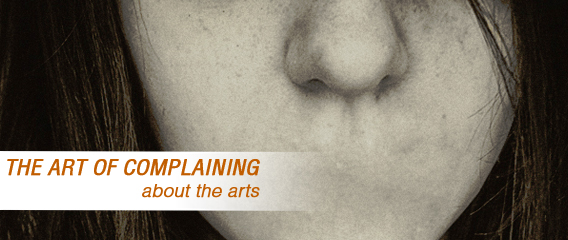This is a self-test to determine if you have a problem complaining about the arts. The goal is to help musicians in the classical music business think before complaining and consider a more constructive approach rather than complaining for the sake of complaining.
[tabs style=”default”] [tab title=”Question 1″][poll id=”2″][/tab] [tab title=”Click to see the correct answer”]
[highlight]Correct answer: “look petty.”[/highlight]
If you have nothing nice to say…blah, blah, blah, but also you never know who has saved a screen capture and will share later.
[/tab] [/tabs]
[tabs style=”default”] [tab title=”Question 2″][poll id=”3″][/tab] [tab title=”Click to see the correct answer”]
[highlight]Correct answer: “obnoxious and tacky.”[/highlight]
Sometimes you forget who your friends are, could be a member of the board, conductor, executive director or patron. I have all of the above in my friend group, and forget frequently who my friends are until they comment. Easier to just not publish this kind of info.
[/tab] [/tabs]
[tabs style=”default”] [tab title=”Question 3″][poll id=”4″][/tab] [tab title=”Click to see the correct answer”]
[highlight]Correct answer: “a way to embarrass your organization.”[/highlight]
While it is an easy way to vent about abuse, once again the list of possible friends you have viewing this can lead to a big problem. Take the complaint through the proper channels.
[/tab] [/tabs]
[tabs style=”default”] [tab title=”Question 4″][poll id=”5″][/tab] [tab title=”Click to see the correct answer”]
[highlight]Correct answer: “all of the above.”[/highlight]
Once in a while a public venting about your frustratingly busy schedule is appropriate. However in difficult times where so many peers and colleagues are finding themselves quickly out of work, it probably would be better to err on the side of not sharing that info. Instead venting in person to a few close friends might be better.
[/tab] [/tabs]
[tabs style=”default”] [tab title=”Question 5″][poll id=”6″][/tab] [tab title=”Click to see the correct answer”]
[highlight]Correct answer: “complain to the conductor about a bowing issue between string sections.”[/highlight]
This is just an example, but in general nobody should ever complain down in rank or pay grade. Also, complaining about something that is in a job title can be tacky.
[/tab] [/tabs]
[tabs style=”default”] [tab title=”Question 6″][poll id=”7″][/tab] [tab title=”Click to see the correct answer”]
[highlight]Correct answer: “to a committee member or staffer out of patron’s ear shot.”[/highlight]
Keep dirty laundry quiet and confined. Complaining publicly about negotiations can complicate issues for many, and people over hearing conversations can and will jump to their own conclusions.
[/tab] [/tabs]
Hopefully, this little exercise will get you thinking about complaints and how easy it is to slip into bad habits, especially in the age of social media. But to be clear, there is nothing wrong with complaining in and of itself; so many times it is the catalyst that improves a situation. However, there are too many times when those of us in the world of classical music are unjustly classified as complainers and malcontents.
Next month will dive a little deeper into the Art of Complaining About the Arts, and try to point out the merits of a good complaint and where complaints come from in the first place.
So how did you fare in the self-test? Did you think of a situation where you or a colleague you know stepped across the line into one of the “wrong” answers? If so, I’d love to hear about it. But keep in mind this isn’t a gossip column, so no names folks. Let’s keep in mind the following disclaimer we’ve all seen: Names have been changed to protect the innocent, the stupid, and because I don’t want to put my foot in my mouth“)











Why is the “Holly is smarter than me” page not found?! Damn. I know this to be this case, although she would most likely deny it in sincere modesty and honesty. Danny Ainge (when he was a player with the Celtics in the 80s) was once asked why he was also complaining. He answered, “I don’t complain. I whine.” (Voila) Whining seems to be the prerogative of soldiers, tired athletes and orchestral players. I think it’s a positive characteristic (and a way of coping) to whine on occasion. However, COMPLAINING is different because it so often becomes personal.
Two quick points: 1. I don’t tend to complain about having to clean two bathrooms when I know there are many who do not have a bathroom at all – or a bed. 2. I try to always know how my complaint is likely to be received and whether it should be delivered to someone else. (I always complain up the chain, not down.) 3. (I know I only said two points but this is good) … A positive complainer always has solutions in mind and leaves the complainee with “face saving dignity,” and a possibility that a solution may be reached. A negative compliant is just too often about blame. If you don’t agree with me, don’t complain on Holly’s page. Tell me I’m an A**hole on my own FB page.